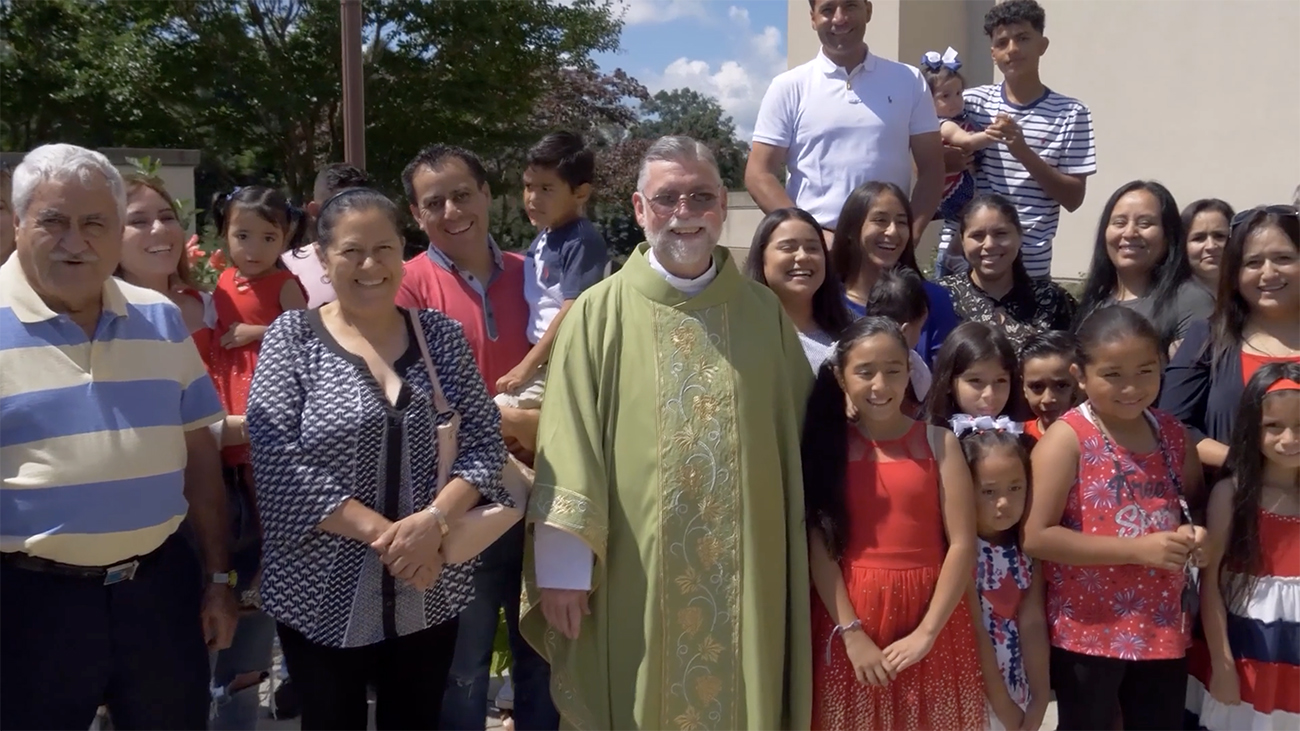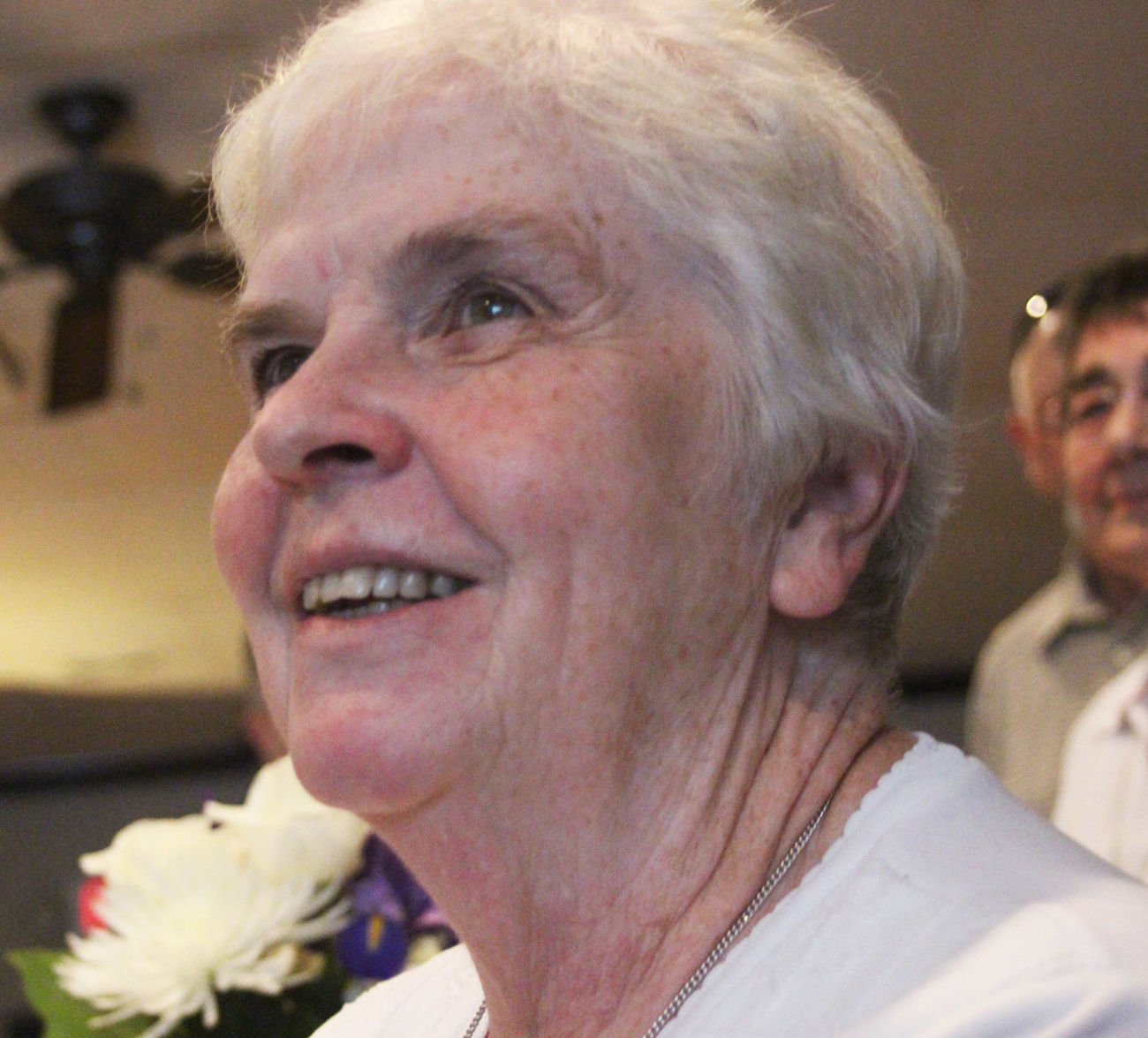
Msgr. Frank Depman stands with several of his parishioners at St. Rocco Parish in Avondale, where he said regular dialogue between pastoral staff and faithful ensures robust Mass attendance and participation in parish life. (Vocation Office for the Diocesan Priesthood/Joyful Films)
For many area Hispanic Catholics, regional listening sessions for the Synod on Synodality are a new take on an already familiar process, according to pastoral leaders.
“Hispanic Catholics love to talk about and share their faith, so getting into groups to do that is natural for them,” said Immaculate Heart of Mary Sister Rose Patrice Kuhn, director of Hispanic ministry at St. Agnes Parish in West Chester. “A lot of other cultures are not really keen on doing that.”
[hotblock]
The regional listening sessions are taking place across the Archdiocese of Philadelphia on the weekends of March 19-20 and April 2-3 at designated parishes throughout the five-county area and virtually via Zoom — register for a session in English or Spanish.
The synod process in the archdiocese is part of the worldwide preparations for the 15th Ordinary General Assembly of the Synod of Bishops at the Vatican in October 2023.
The two-year synod process was launched by Pope Francis in October 2021, with the theme of “communion, participation and mission.”
In the Philadelphia Archdiocese, local sessions were announced in February by Msgr. Brian Hennessy, pastor of St. Alphonsus Parish in Maple Glen and coordinator for the archdiocesan phase of the synod. Each of the gatherings will be led by facilitators trained by Malvern-based Catholic Leadership Institute (CLI), and the session results will be compiled into a report by June.
Resources for parishes plus general synod information are available at the archdiocesan website, ArchPhila.org/synod.
In tandem with archdiocesan synodal activities, CLI is also implementing the archdiocese’s “Called for More” initiative, using the “Disciple Maker Index” (DMI) tool to survey pastoral engagement among archdiocesan clergy, parish leaders and parishioners.
In addition to the regional listening sessions, parishes have been encouraged to host their own sessions as well, and St. Agnes has scheduled several, said Sister Rose. She anticipates active participation from Hispanics at the sessions.

Immaculate Heart of Mary Sister Rose Patrice Kuhn, director of Hispanic ministry at St. Agnes Parish in West Chester, said many Hispanic Catholics regard the archdiocesan phase of the synod as an extension of the ongoing Encuentro process led by the U.S. bishops. (Gina Christian)
A recent Lenten retreat at St. Agnes drew some 40 to 50 Spanish-speaking Catholics, who stayed despite a snowstorm for several talks and small breakout sessions, she said.
For every question the retreat moderator asked, participants raised “three to four more,” said Sister Rose. “They were dying to say what they had to say.”
Father Thomas Higgins, pastor of Holy Innocents Parish in Philadelphia, said “regular prayer meetings” (circulos de oración) among Hispanic Catholics tend to foster such continuous communication.
“On any Friday night there are about 15 to 20 (Spanish-speaking members) at our parish, praying in tongues, saying the rosary and sharing,” he said. “When it comes to a listening session, they are more comfortable … and given the kind of things the listening sessions are asking– what’s right about the church and what needs improvement — they’ll be very open.”
Part of that enthusiasm can be traced to the national Encuentro process, an initiative of the U.S. bishops that since 1972 has brought Hispanic and Latino faithful together at regular intervals for consultation, missionary activity, leadership development and pastoral discernment.
Encuentro takes place from the parish to the national level, focusing on ways to strengthen the bonds between the church and Hispanic and Latino Catholics.
[hotblock2]
“People have said to me, ‘This (archdiocesan phase of the synod) is like the Encuentro,’” said Sister Rose. “They identify it with that, and they’re happy it’s continuing.”
Parishioners to whom she ministers are also “excited the pope is asking for their opinions,” she said.
While the parallel listening sessions and DMI aim to capture as much feedback as possible, pastoral leaders have noted there is some confusion among the faithful about the two.
“They think that if they complete the DMI, that’s the listening part of the synod,” said Sister Rose.
She also observed that a number of Hispanic Catholics in her parish — particularly those who have only recently immigrated to the U.S. — lack consistent access to the internet, and cannot receive pastoral communications or access the online synod resources.
Another challenge has been finding an adequate number of those materials in Spanish, said Msgr. Francis Depman, pastor of St. Rocco Parish in Avondale, the archdiocese’s first national parish for Hispanics.
As a workaround, “we’re personally inviting people to come to the regional listening sessions,” he said. One of the sessions will be held March 19 at St. Rocco.
Despite the communications challenges, he remains hopeful for a good turnout, especially since Mass attendance and weekly collections at St. Rocco have rebounded to and even exceeded pre-pandemic levels — a recovery that highlights the strength of ongoing pastoral dialogue, he said.
“As a church we’re always called to listen, and the reason St. Rocco has been successful is because I’ve been able to sit down with people and say, ‘What is it you’re looking for as church?’ and try to make that happen,” said Msgr. Depman.
Above all, faithful with whom he has spoken seek “something that grounds their life and gives them a sense that they’re a part of the family,” he said. “They want to know the church is going to be there, no matter what difficulty they’re facing, what suffering, what hardship, what fear – that the church is right there, waiting with its doors open to them.”
PREVIOUS: Montco parish raises $3,600 for Ukraine hospital
NEXT: Montco teen dedicates Eagle Scout project to archdiocesan ministry


Share this story